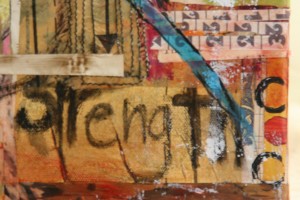Critique and Beyond: The Draft as the Movement (A Postscript and a Prelude)
By Susannah Bartlow
The voice came from a small, weighted core in my chest—“hello?” As my eyelids dragged open I felt the wires—on my legs, my hips, my cheeks, my scalp. My usual early-morning deep fog was weighted more heavily by the unfamiliarity of my surroundings—a pseudo-hotel room staged for an overnight sleep study. I called three more times, each time escalating the intense vulnerability: plugged in, unable to move, for my own good, wondering whether out loud was loud enough to activate the voice monitor. Was the nurse asleep? Was I alone in this office complex?
My attempt to address the persistent exhaustion that has grown incrementally over the last 6 years of my academic working life triggered something much deeper. I was aware, suddenly and profoundly, how few times in my life I permit myself to be truly vulnerable—and how many circumstances of my life protect me from this essential experience. In the midst of this community conversation about moving beyond critique, I lay in bed obsessing about the forum, feeling confidence and fear—isolation and connection—newly forged relationships and movement partners and a deeper understanding of what I need to do to show up—not to be right, but to be vulnerable.
***
This idea came in a deep Midwestern midwinter. In my day-to-day professional life, I often feel isolated—although I dash from meeting to meeting, as the sole staff person representing a new office at a to-me-still-pretty-new-university, I can go through the day often feeling like I haven’t really connected with anyone (except by email). A lot of my collegial conversation happens over email and Facebook, especially my scholarly conversation. This isolation can contribute to a sense of futility, which comes up as frustrated critique—of individual phrases I overhear on campus; internal, self-critique of decisions or strategies; of this or that website or article that isn’t quite what I need it to be… and I got to realizing that my critical mode was (as many contributors name) a kind of shell that held me inside. The idea of abandoning the struggle to name, critique, or identify felt overwhelming—and a little irresponsible—aren’t I supposed to be a whistleblower, or at least an ally?
Although Facebook often builds intolerable tensions between my personal work and my spiritual practice, I cling to it as a lifeline—to my friends and family’s baby pictures, to silly song covers and great new music, to knitting patterns and updates from college friends—and, most frequently, to articles that validate my viewpoint by interrogating others or by raising the profile of events I don’t hear about in mainstream news. It’s where I first learned about Trayvon Martin, Islan Nettles, and Renisha McBride; where I went to find out what people were saying about #SolidarityIsForWhiteWomen; where I search for the spiritual posts from a handful of collegial acquaintances who flip the script.
I see new advice for how to call “in” rather than calling out. My eyeballs blister and my mind races with the many ways I could be doing better, greater more, and oh look! Cute cats as an antidote.
The visual stimulation is intense.
So when I sent up this flare, I’d been reading a lot of online social justice articles, and I’d been thinking this for a long time. And all this oppositional language was building suspicion in me, and contributing to an antagonistic relationship with my professional life, where I not only didn’t have the community, but didn’t even speak the language. I heard the aerous pop of its launch and hoped Stephanie and Duchess, and the Feminist Wire, would see my light from out here in the field.
***
There’s a claim that the *way* we do our work matters as much as the work itself. I don’t know if I entirely believe that—and I’m not well-read enough in social movement history to make a definitive rebuttal. But I DO notice that many of the most effective people, then and now, have a generous, warm, adult spirit to the way they move. We might not always agree, ideologically or tactically, but they are always considerate and compassionate, and they get shit done. Meanwhile, I feel myself – and know of many others – to struggle. Publicly (as I never assume that the leaders I admire do not hold deep, intense, difficult struggle). And so some of this quest to move beyond critique is a quest to grow more in the spirit of movement-building.
Mid-week, I began to question that whole idea—beyond what? Why beyond critique at all, if criticism should always be present? Is this an overstretched lunge for utopia? A personal project masquerading as a movement?
The forum opened up personal conversations at a level I hadn’t anticipated—two former students engaged one another on a comment thread; my own relationships and connections strengthened; some of my urge to move “beyond critique” was tested and grew through a discussion of community and individual visions of the liberated world. I facilitated a discussion at my campus’ “The Vagina Monologues” on the same day that Meera Seshadri’s piece was published. A friend mentioned some discomfort with the academic register of many of the submissions; I utterly agreed, and yet relished each word of each piece, both for its writer’s spirit and for many of the phrases and ideas.
And then there were all the planning and organizing emails—late night and early morning; Facebook messages and Twitter corrections. I’m a guest at the Feminist Wire and felt myself trying, trying so hard to be professional and available and leaderly and collaborative, and missed having nonverbal cues to know whether the dynamics I imagined are the dynamics that are true. Building the forum has also involved me questioning where energy goes and how it is diffused. Clumsy, messy, imperfect, continuously improving—the draft as the movement. This is not a conclusion.
________________________________________________
 Susannah Bartlow is director of the Gender and Sexuality Resource Center at Marquette University in Milwaukee, Wisconsin. She teaches in Women’s and Gender Studies and English and is currently at work on two writing projects—scholarship on white women’s subjectivity in contemporary literature of cross-racial coalitions and a creative project (titled “Survival”) about personal and institutional liberation from gendered and sexual violence. Susannah was also the founding Director of the Women’s Center and contributing faculty in the Department of Women’s and Gender Studies at Dickinson College in Carlisle, Pennsylvania. She is a member of the Milwaukee International Women’s Day Committee, the Anti-Racism/Anti White Supremacy Working Group of the Women’s Center Committee of the National Women’s Studies Association and the Consortium of LGBT Higher Educational Resource Professionals. She earned a bachelor’s degree in English from Bryn Mawr College, and a master of arts and a doctoral degree in English from University of Buffalo.
Susannah Bartlow is director of the Gender and Sexuality Resource Center at Marquette University in Milwaukee, Wisconsin. She teaches in Women’s and Gender Studies and English and is currently at work on two writing projects—scholarship on white women’s subjectivity in contemporary literature of cross-racial coalitions and a creative project (titled “Survival”) about personal and institutional liberation from gendered and sexual violence. Susannah was also the founding Director of the Women’s Center and contributing faculty in the Department of Women’s and Gender Studies at Dickinson College in Carlisle, Pennsylvania. She is a member of the Milwaukee International Women’s Day Committee, the Anti-Racism/Anti White Supremacy Working Group of the Women’s Center Committee of the National Women’s Studies Association and the Consortium of LGBT Higher Educational Resource Professionals. She earned a bachelor’s degree in English from Bryn Mawr College, and a master of arts and a doctoral degree in English from University of Buffalo.





3 Comments